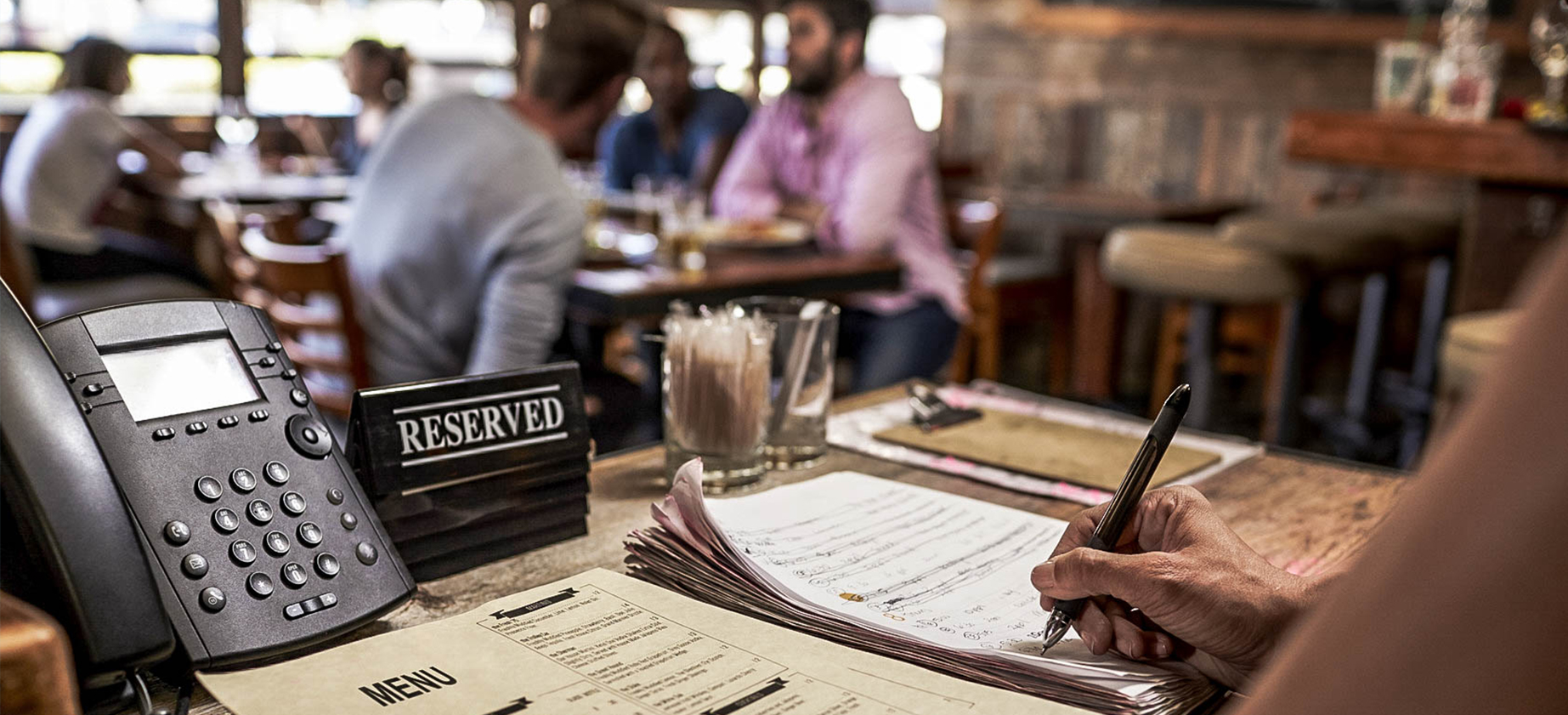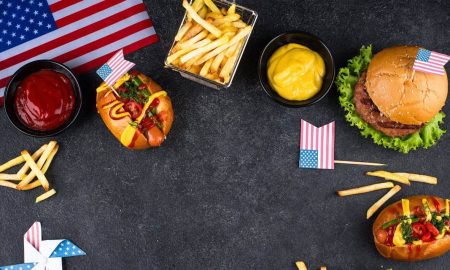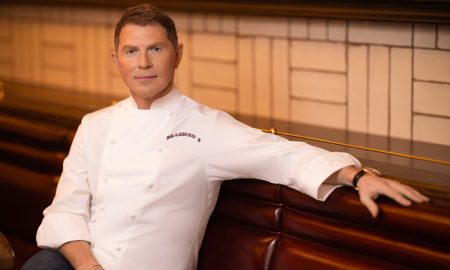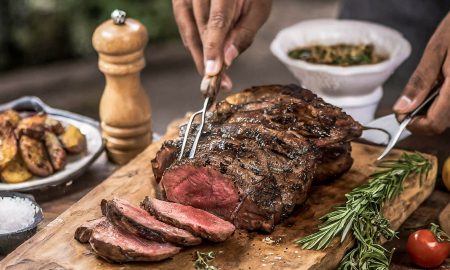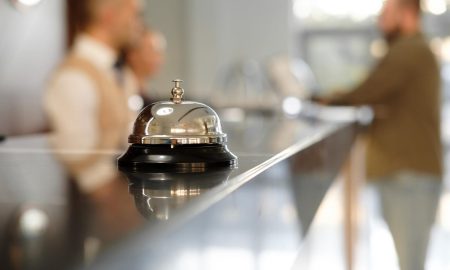More and more often, restaurant operators find themselves dealing with people making reservations and then not showing up. That happens all over the place, of course – sports stadiums, theaters, you name it – and it happens for any number of reasons. With restaurants, though, it’s a little different: those tickets to the opera or the big game were bought in advance,
but most restaurants in the German-speaking world don’t charge reservation fees when diners reserve a table and then don’t come to claim it. What’s the problem, though? Well, by the time the customer shows up for dinner, a lot of work has already been put in. The table’s set, the flowers are out, the ingredients have been paid for, and the restaurant team is ready. The restaurant is expecting customers, because the customers have told the restaurant they’re coming. Restaurant staff count on customers to keep their word. Sometimes they have to turn other potential customers away because they’re fully booked. And then the customer simply doesn’t show up. Annoying? Frustrating? Disappointing? You bet.
In Michelin-starred restaurants, which often seat fewer than 20 people, it can even have serious financial consequences. “Nobody gets upset when someone cancels. We don’t even get upset when people cancel short-term. We only get upset when people just don’t show up at all.” Roland Trettl, restaurant consultant and longtime chef at Hangar-7, knows the problem all too well.
Simple politeness
“Besides the fact that picking up the phone and canceling is a simple matter of politeness, no-show customers simply disregard the fact that the restaurant is losing out on an entire table’s worth of revenue,” Trettl says. In fine-dining establishments, which generally operate on
razor-thin margins, one cancellation can make the difference between the restaurant making or losing money that day. When you look at it that way, no-shows are absolute no-gos.
Trettl assumes some customers simply don’t think anything of it – they view reservations as vague declarations of intent. Rumor has it that some customers even have their assistants reserve tables at four different places at the same time, so that they and their friends can decide last-minute what they feel like eating. “Most of the time, no-shows are a sign of arrogance,” Trettl notes. “People don’t think it’s necessary to bother canceling.”
A few top chefs have already taken measures to combat this type of unreliable behavior. Dylan Watson-Brawn at Ernst in Berlin is among the small vanguard of German chefs who require customers to purchase tickets for a menu when they make their reservations. His menus are planned and staged with as much care as a theatrical performance, except the stars are, well, edible. Tickets are available for €165 from the restaurant’s online shop. “We can’t afford to have customers decide in the afternoon that they’d rather do something else that evening,” says the Canadian native, who serves Berliners only the very freshest, tastiest ingredients, prepared using methods that are both highly purist and extremely labor-intensive. Watson and his team were the first ones in Germany to start using the American online system Tock, which is now starting to catch on more and more among high-end restaurants.
Reliability is key
“Our opinion is relatively clear: no-shows are deadly for restaurants,” says Sophie Lehmann, the vinophile head of the 100/200 Kitchen in Hamburg. “We were the second restaurant in Germany to start working with Tock.” Lehmann explains that establishments that emphasize quality in every aspect of their work – products, time, service – count on their customers to be dependable in terms of their reservations. No-call no-shows, she says, show “a lack of appreciation and respect for the work that goes on in the restaurant world.” The greater the restaurant’s expected revenue per customer, the more of a disaster it can be – for some places, one missed table reservation can mean losing thousands of euros. And less certainty in planning means that restaurants have to buy lower-quality products, because otherwise the financial risk would be too great.
“For us, that’s reason enough to use an online system. Customers book their tables and pay in advance. They pay in advance when they go to a concert or to the theater, too, because it’s worth it to them, and because they want to enjoy something that other people have made a career out of,” Lehmann notes. As with concert tickets, Tock reservations are non-refundable, but 100 percent transferable.
Menu prices vary from day to day
In fact, Thomas Imbusch, Jan-Phillip Fricke, Sophie Lehmann and their team take things one step further: ticket prices vary from day to day. “Prime time” tickets for meals on Thursday through Sunday cost the regular rate of €119. On Tuesdays and Wednesdays, which are normally slower days for restaurants, they charge a little less – just €95. The two-tier pricing system helps equal out expected traffic and allow them to plan more consistently throughout the entire week. The model also creates a lower-cost option for customers who can’t fit the regular-priced tickets into their budgets. The actual menus themselves are identical on all days, of course. Lehmann says it’s about the farmers as well: “It’s like buying high-quality meat and vegetables from farmers you know personally, and then throwing half of everything away. That would just be wrong, disrespectful to the food as well as to the people who grew or raised it.”
Internationally established
Michelin-starred restaurants aren’t really the type of place people go to spur-of-the-moment, so empty tables generally stay empty. “Internationally, selling tickets and charging cancellation fees are both well-established ways of preventing that,” says Leonie Weber, Marketing Director at the Four Seasons in Hamburg. She points out that it’s totally normal to charge customers who cancel flights or hotel rooms on short notice. “London, Paris, New York… Even Germans have no problem with the idea when they go abroad,” she says.
According to Weber, the decision ultimately depends on what type of business it is. A fast-casual place with high volume? A restaurant with fixed meal times? A gourmet restaurant with a handful of tables? “When you’re working with fresh, high-quality products, preparing them to perfection day after day, the long-term financial consequences can end up being severe,” Weber says.
Customers show understanding
In fact, customers who reserve tables at Haerlin are understanding about having to fork over an €85 fee for failing to show. The restaurant sends them a bill after the fact. “We try to use that extra free time to develop new recipes,” says Weber, “or else we send employees home a little early.”
Frank Glüer, sommelier at the two-Michelin-starred Esszimmer in Munich, says that his own establishment started requiring customers to provide credit card information when making reservations nine months ago. The restaurant implemented the policy after realizing that no-shows were costing them tens of thousands of euros every year.
Now, diners have to register in advance through the Michelin portal bookatable.com. Glüer says that the new system has greatly improved morale regarding cancellations. “You can still cancel up to 24 hours in advance; after that, it’s a hundred euros per person.” Regulars are exempt from the requirement, of course, “and we’re quite lenient when we’re able to find new customers for those seats.” After all, many people have perfectly understandable reasons for needing to cancel.
Initial skepticism
Some customers were skeptical at first about handing out their credit card information, mainly for data security reasons – they were afraid the number might fall into the wrong hands. That’s all changed now, the sommelier says. “There are always a few people who don’t think it’s such a great system, but nowadays it’s indispensable,” he adds. Bobby Bräuer and the rest of the team at Esszimmer initially reached out to other top restaurants in Munich to discuss the practice. “It didn’t really work, though,” Glüer says. “Every place does it their own way.” Some restaurants only requested credit cards from foreign customers, he says; others billed customers for €200 if they didn’t cancel at least five days in advance. One way or another, Glüer expects the online reservation system to become a mainstay in high-end restaurants.
In Hamburg, Haerlin, Jellyfish, Seven Seas Süllberg, and Jacobs Restaurant have all agreed upon a unified reservation codex. The restaurants charge customers’ credit cards an 85-euro fee for “non-appearance without prior cancellation”; as they describe it, the charge helps them “ensure the financial feasibility of their high quality standards” in the future.
Simply criminal
Occasionally, no-show behavior
can even take on criminal overtones.
In his book, “Served,” Roland Trettl recounts how someone reserved large tables – for eight to ten people – in restaurants all over Austria. When making the reservations, the caller always suggested that the chefs prepare something special, and asked that the sommelier go ahead and open a couple of expensive red wines so that they could breathe. And then nobody showed.
Trettl himself only learned of the incident when his colleague Heinz Hanner called him to ask why he didn’t make the reservation with him personally; shortly thereafter, another colleague called to ask if he was still planning on coming.
“At that moment, I knew that something very fishy was going on. Unfortunately, the system can always be exploited, whether it’s by customers who don’t show out of carelessness or arrogance, or by people who want to do you harm.”
If you’re interested in learning more about this topic, check out the Nuts stage at CHEFDAYS Austria and Germany and listen in on the panel discussion.


